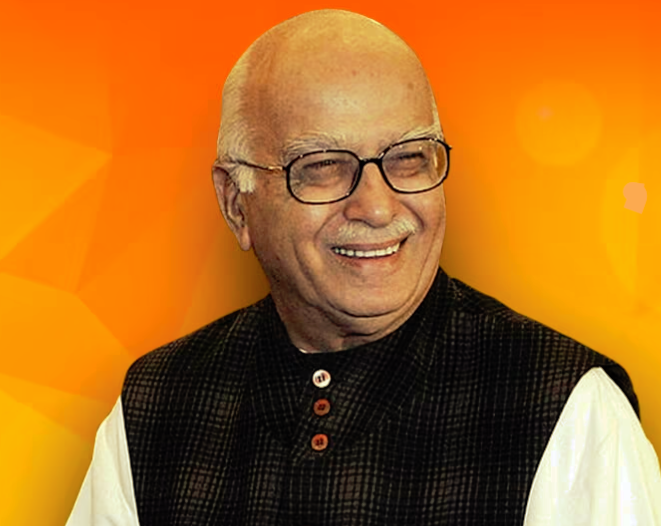
Lal Krishna Advani
New Delhi: Veteran Bharatiya Janata Party leader Lal Krishna Advani, who also served as the Deputy Prime Minister of the country between 2002-2004, has been awarded the nation’s highest civilian award, the Bharat Ratna, a press communique from the Rashtrapati Bhavan informed here today.
Advani is the second person to be conferred the Bharat Ratna this year after Karpoori Thakur who was given the award posthumously.
“The President has been pleased to award Bharat Ratna to Shri Lal Krishna Advani,” the Rashtrapati Bhavan press communique stated.
Born on November 8, 1927, Advani grew up in pre-Partition Sindh, and joined the Rashtriya Swayamsevak Sangh as a student in St.Patrick’s School, Karachi, when he was just fourteen years old.Prime Minister Narendra Modi took to social media platform X to share the news of Advani being conferred the Bharat Ratna. “I also spoke to him and congratulated him on being conferred this honour. One of the most respected statesmen of our times, his contribution to the development of India is monumental,” Modi tweeted and recalled that Advani’s life started from working at the grassroots to serving the nation as a Deputy Prime Minister. “He distinguished himself as our Home Minister and I&B Minister as well. His Parliamentary interventions have always been exemplary, full of rich insights,” Modi stated. Modi went on to state that Advani’s decades-long service in public life was marked by an “unwavering commitment to transparency and integrity, setting an exemplary standard in political ethics”.
“He has made unparalleled efforts towards furthering national unity and cultural resurgence. The conferring of the Bharat Ratna on him is a very emotional moment for me. I will always consider it my privilege that I got countless opportunities to interact with him and learn from him,” the Prime Minister stated and shared his photos with Advani on X.
Union Home Minister Amit Shah stated that the decision of Prime Minister Narendra Modi to honour Advani with ‘Bharat Ratna’ was “also an honour for crores of countrymen”. In a post on X Platform, Shah said Advani’s “immense contribution towards the party and ideology cannot be summed up in words”.
It may be mentioned that Advani along with the late Atal Behari Vajpayee were the two tallest Bharatiya Janata Party (BJP) leaders during the National Democratic Alliance (NDA) regime under the Prime Ministership of Vajpayee.
In the run-up to the 2009 elections, Advani was considered the BJP’s Prime Ministerial candidate for the general elections, ending on May 16, 2009. However, his hopes were dashed as the rival Congress-led United Progressive Alliance (UPA) returned to power for the second consecutive time.
After Modi assumed the office of the Prime Minister in 2014 following the BJP’s win in the general elections, he shifted Advani along with another former BJP president Murli Manohar Joshi to a newly created ‘Margdarshak Mandal’.
Advani served as the president of the BJP for the longest period since its inception in 1980. Earlier, he had also served as the president of the Bharatiya Jana Sangh (BJP’s parent organisation) in December 1972. He became a founding member of the BJP and in 1980, when the party was formed, he along with Sikandar Bakht and Suraj Bhan was given the responsibility of its general secretary while Vajpayee was elected its first president.
Through the latter half of the 1980s and the 1990s, Advani focused on building the BJP into a national political force. Between 1980 and 1986 he held the position of general secretary of the BJP. In May 1986 he became the president of the BJP and thereafter on March 3, 1988, he was re-elected as the president of the party. The results of his efforts were underscored by the 1989 General Election. The party bounced back from its 1984 tally of 2 to achieve an impressive 86 seats.
In the early 1980s, when the Vishwa Hindu Parishad (VHP) began a movement for the construction of a temple dedicated to the Hindu deity Rama at the site of the Babri Masjid in Ayodhya, under Advani, the BJP became the political face of the Ram Janmabhoomi campaign. In 1990, when the nation faced a tumultuous time in the wake of the implementation of the Mandal Commission report on caste-based reservation in education and government jobs, Advani embarked upon his now-famous Ram Rath Yatra to unify the Hindus divided along the caste lines. His yatra was stopped in Bihar and he was arrested by the Laloo Prasad Yadav government in the state.
However, the Ram Rath Yatra helped the BJP move up its position to 121 seats in 1992 and 161 in the 1996 general elections; In the 1996 elections, for the first time since independence, the BJP became the single largest party in the Lok Sabha.
– global bihari bureau





